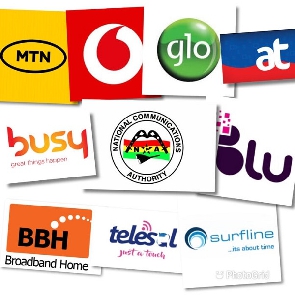On June 20, 2023, out of the blue, Ghana's telecoms industry regulator, the National Communications Authority (NCA) made a post on its official Twitter handle (@NCAGhana), explaining the rationale for classifying and declaring MTN Ghana as a Significant Market Power (SMP) exactly three years ago in June 2020.
Some industry watchers felt the post was much-ado-about-nothing because it is rather late in the day for NCA to now try to explain the purpose of SMP after three years of declaring it on MTN, and two years of implementing regulatory interventions in that regard.
But for what it is worth, let's look at the key point in the post within the context of how the entire industry has fared under this regime of NCA. It will probably reveal why NCA felt the need to address what it deemed to be a nagging public concern about the fate of MTN in the face of the SMP interventions.
The main fresh point in the Twitter post was the statement in the third paragraph that “The SMP classification is not intended to punish or stifle MTN's operations but rather to ensure a level playing field in the market and protect consumers' choices."
All the other explanations in terms of the reasons for declaring an operator as SMP is something that has been put in the public domain several times by yours truly, prior to the declaration, and also by the NCA itself and the Minister of Communications during and after the declaration.
So the big question is, why would the NCA find it necessary, after three years of declaring and two years of implementing SMP interventions, to issue a statement, not to tell us about the impact of the interventions so far - as in the extent to which it has corrected or is correcting the marketing imbalance - but rather to explain what SMP was not meant to do?
For instance, GraphicOnline reported on May 9, 2023, that the NCA claims one of the SMP interventions - 30% asymmetrical interconnect rate - saved the three non-SMP telcos a total of GHS86.6 million between October 2020 and December 2022. This was money they would have paid to MTN, if not because of that particular SMP intervention.
This is a good testimony. But let's put it in some context - in 2021 alone MTN Ghana spent GHS1.485 billion in capital expenditure (capex). Then in 2022, its capex was GHS2.1 billion. This means for those two years, MTN invested GHS3.585 billion in its network. So, GHS86.6 million shared among three telcos to invest and compete against MTN is like a drop in the ocean. But let's still try and understand how they saved that amount.
Interconnect rates
Interconnect rates are what telcos pay to each other for terminating traffic (calls and SMS) on each other's networks. For instance, if MTN terminates a call on Vodafone and charges the caller, there is a percentage of that money that MTN has to pay to Vodafone at the end of every month.
To the structure of Ghana's telecoms market, where MTN is the overwhelmingly dominant player, each of the other telcos terminates more calls on MTN than MTN does on the other networks. So, at the end of every month when the reconciliation is done, every telco pays MTN, but MTN pays nobody. It is that simple.
Read my first-ever SMP article titled "Are Other Telcos Working for MTN Now?", published in December 2019, and you will get the picture.
From what we gather, all the telcos pay the interconnect fees to MTN regularly every month, except Glo, which owed MTN, and probably other telcos prior to their service termination in April last year. The defunct Kasapa (Expresso) also used to owe all the telcos heavily before the company collapsed.
So, what the NCA did with the SMP intervention on asymmetrical interconnect fees was to reduce what each telco pays to MTN by 30% for that two-year period and that was how they made the savings. Vodafone saved GHS50.4 million, AT saved GHS34.8 million and Glo saved GHS1.6 million.
That is not bad, and one would have expected the NCA to tell us more of such stories in the second year of implementing SMP regulations on MTN. So, why would the NCA rather choose to tell us what SMP is not for at this time?
Could it be that the NCA is being haunted by the fact that under its watch, almost all the players in the industry have either collapsed or are in distress, except MTN - so it has noticed the public is concerned that its SMP interventions could land MTN in a similar fate?
And could it also be that, contrary to NCA’s claim that the aim is not to stifle the operations of MTN, the SMP move is actually designed to curtail MTN’s growth in a bid to correct the NCA’s own failure to prevent the status quo long before now?
This is not far-fetched because the words of NCA itself indicate that it is aware of a nagging public concern about how the manifestations of the SMP interventions are constraints on MTN - as in denial of GHS86.6 million, a directive not to have the lowest prices on the market and the recent quashing of MTN's affordable prices for Data Zone Bundles.
It is interesting that after three years of the SMP declaration, NCA is now saying in the last paragraph of the June 20 Twitter post that - the SMP declaration cannot stop MTN from expanding and growing its business.
Why didn’t NCA say that from the onset? Why are they saying that now, when SMP has failed to deliver on the main target? And why do you think MTN went to court over the SMP declaration if they did not feel threatened by it?
The irony
When the NCA Director-General was asked recently what has been the real impact of the SMP implementation, in terms of correcting the market imbalance, he pulled up a slide that indicated that MTN has rather grown in leaps and bounds over the period and the other telcos, who were intended to be the beneficiaries of the SMP rules, have rather lost market share considerably.
One wonders why the NCA DG would do that. Could it be because there are no real positive stories to tell?
This writer was the first and probably the only journalist who wrote about the need to declare MTN SMP exactly six months before the government mastered the courage to do it. The argument was very simple - the National Communications Policy places the threshold for declaring an operator SMP at 40% market share over a considerable period.
At the time of writing that article, MTN had held way more than 50% market share for about 15 years. Additionally, it was estimated that MTN had over 90% of the mobile money market share, more than 70% of all calls and SMS terminated on MTN, plus more. So, the justification was not in doubt.
As the NCA explained in its June 20, 2023 statement, and as per ITU's position on SMP, that kind of dominance poses a threat to the sustainability of the industry, and could lead to a monopoly and eventually shortchange consumers in terms of one player controlling prices and determining what quality of service everyone must accept since consumers would have no other real choices.
It also fuels the potential of the dominant player having the ability to ward off new entrants. Indeed, there have been discussions in the industry about how some potential investors with interest in Ghana's telecom market are very concerned about MTN's market position and how that is a put-off for them.
But let's come back to the elephant in the room - why NCA is focused on what SMP is not for and not on the impact so far? For one, even though NCA claims the SMP interventions were to protect consumers, MTN customers recently suffered a blow when the NCA ordered MTN to suspend its affordable Data Zone Bundles.
There was a huge public outcry over the directive because the bundles in that package were highly patronized by students in particular for their school work because it was very affordable. But the NCA stopped MTN from offering it at that price, all in the name of SMP intervention.
In fact, generally, MTN has been directed by NCA not to have the most affordable prices on the market. That is consistent with SMP regulations everywhere in the world. But one can also understand why consumers would question how that protects them.
Maybe it was intended to make MTN customers port to other telcos where prices are presumably lower. But how those other telcos are investing to improve the quality of service for even their existing customers is not the priority of NCA.
The Director-General, for instance, admitted that the smaller telcos are expected to invest their GHS86.6 million savings into network infrastructure improvement, but NCA cannot tell them exactly how to invest that money.
So, let's look at the roll call that is probably fuelling the concerns that the telecoms industry seems to be collapsing under this NCA.
Bailouts and Collapses
Under this particular NCA alone, three telcos have bailed out of the market (Airtel, Tigo, and Vodafone), one has stopped operations but is still holding on to its license (Glo), and all the Broadband Wireless Access (BWA) operators have practically collapsed (Surfline, Busy Ghana, Broadband Home, Blu Telecoms), except Telesol, which itself is in distress and is managing to survive on the back of some negligible number of customers.
Airtel and Tigo
The first to exit the market were Bharti Airtel (Airtel) and Millicom International Cellular (Tigo). The two were compelled to merge in 2017 because, on their own, they simply could not make ends meet, and they were suffocating under heavy debts to creditors, vendors, and even some value-added service providers.
The two held third (Tigo) and fourth (Airtel) positions in the market for a long time. But after the merger, the resulting entity - AirtelTigo (now AT), jumped to the second position, in terms of subscribers, briefly, and quickly dropped to third position behind Vodafone Ghana.
In 2021, the owners of AirtelTigo decided they had had enough of the Ghanaian market, as there was no hope of their fortunes becoming any better as they had hoped with the merger. They tried a change of management to bring some fresh blood and superior brains to the table - but it was all too late.
Even as a merged entity they still continued to pile up debt with creditors and with vendors like independent tower company, ATC Ghana. To date, the debts are still pending. Eventually, they had to sell to the government of Ghana for a stated US$1.
But each of the two entities reported to their respective shareholders that they made US$25 million each from the transfer of shares to the Ghana government.
So, those were two major telcos gone, and one of their main complaints, while they were here, was that the NCA had failed to regulate the industry in a manner that protects smaller players in the face of an obviously dominant player called MTN and its independent towerco ally, ATC Ghana.
In private conversations, they mentioned a study commissioned by NCA, which revealed that all the conditions existed for MTN to be declared an SMP long before 2020, but NCA sat on the report, for reasons only known to the NCA at the time.
The mention of NCA sitting on that said report until 2020 brings a question to mind. When you juxtapose that against the NCA’s comment that the SMP declaration is not meant to stifle MTN’s operations - is the NCA telling us that they delayed because an earlier declaration would have stifled the operations of MTN? Just asking!
The second part of this two-part article will look at what happened with Vodafone, Glo, and the BWA's and why the public might be concerned that MTN is being stifled on purpose. It also touches on how the NCA created the monster called MTN and is now struggling unsuccessfully to tame it.
The author, Samuel Dowuona, is a multiple award-winning telecoms and technology industry journalist, and also the CEO of www.techfocus24.com. He can be reached at dowuonasamuel24@gmail.com
Business News of Thursday, 29 June 2023
Source: TechFocus24













